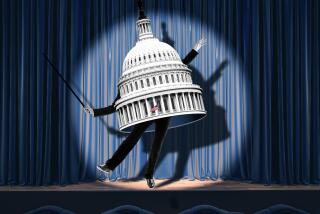ARTS CONFERENCE WILL EXAMINE FUNDING ISSUES
- Share via
ST. PAUL, Minn. — The National Assembly of State Arts Agencies will open its 12th annual conference here Thursday on the theme of “Appreciating the Investment,” a topic of particular concern in an era of shrinking budgets and tax overhaul.
About 400 representatives from state arts agencies across the nation are scheduled to attend the Twin Cities conference that meets through Sunday. They will be joined for the first time by a group of state legislators who are members of the National Conference of State Legislatures’ committee on arts, tourism and cultural resources.
“We will focus our activities upon taking stock of the gains made, highlighting current issues and examining future strategies,” stated the assembly’s Executive Director Jonathan Katz in the conference’s official bulletin.
“ ‘Appreciating the Investment’ will capitalize upon the attendance of state arts agency leaders from throughout the U.S. and its jurisdictions to provide a national marketplace of ideas on support for the arts.”
At his Washington headquarters, Katz said he liked “the pun about appreciation,” which he observed encompasses appreciation both financially and emotionally. “Many states have been experiencing revenue shortfalls--mining, farming and oil states. However, aside from some isolated cases, there has been no reduction in commitment to the arts.”
Conference events will be bracketed by developments in Washington. Final budgets for the National Endowment for the Arts, the National Endowment for the Humanities and the Institute for Museum Services for fiscal 1987, which began Oct. 1, are likely to be available as formal sessions open. And President Reagan is scheduled to sign the massive tax reform bill shortly after he returns from the pre-summit in Iceland.
Between sessions, delegates also will be visiting Minneapolis’ fine-arts complex; watching a performance at the Guthrie, the flagship of American regional theaters; hearing the Minnesota Orchestra and the St. Paul Chamber Orchestra, as well as attending a broadcast of Garrison Keillor’s “Prairie Home Companion.”
While the subject of tax change on donations to arts organizations is not on the official agenda, conference leaders anticipate its being raised.
“Under all previous tax laws, corporations were able to deduct up to 5% of their pre-tax dollars for charitable giving,” Sam Grabarski, executive director of the Minnesota State Arts Board, noted. “We have (here) one of the vanguard 5% Clubs in the United States. And we have a 2% Club including Fortune 500 members. While taxes are not literally on the agenda, we expect to receive a briefing.”
Katz said that one of the reasons St. Paul had been chosen as the conference site this year, is because the Twin Cities are “very rich in arts and cultural life. This is a community that has invested in the arts in an exemplary fashion in both the public and private sectors. The corporate community has been known nationwide for its commitment to the arts, its 5% and 2% clubs.”
Frank Hodsoll, chairman of National Endowment for the Arts, will address the conference Friday morning. He is expected to reveal changes in the selection of challenge-grant recipients.
Last year in Seattle, Hodsoll caused a storm of dissent over his controversial arts-education proposals, which overshadowed that conference’s pre-planned theme on public art. However, in a significant compromise in May, incorporating both his own proposals and those of many of the state arts agencies, Hodsoll appeared to calm the waters. In a pre-conference session today, arts education representatives will discuss the changes.
At the conference, the assembly also ranks the states on per-capita funding for the arts and on percentage of state budgets devoted to the arts. Last year California ranked 27th (excluding the territories) in per-capita funding, and 40th in percentage of state budgets.
The California Arts Council is sending five representatives to the conference, led by Executive Director Robert Reid. A sixth staffer is attending on her own time.
More to Read
The biggest entertainment stories
Get our big stories about Hollywood, film, television, music, arts, culture and more right in your inbox as soon as they publish.
You may occasionally receive promotional content from the Los Angeles Times.










